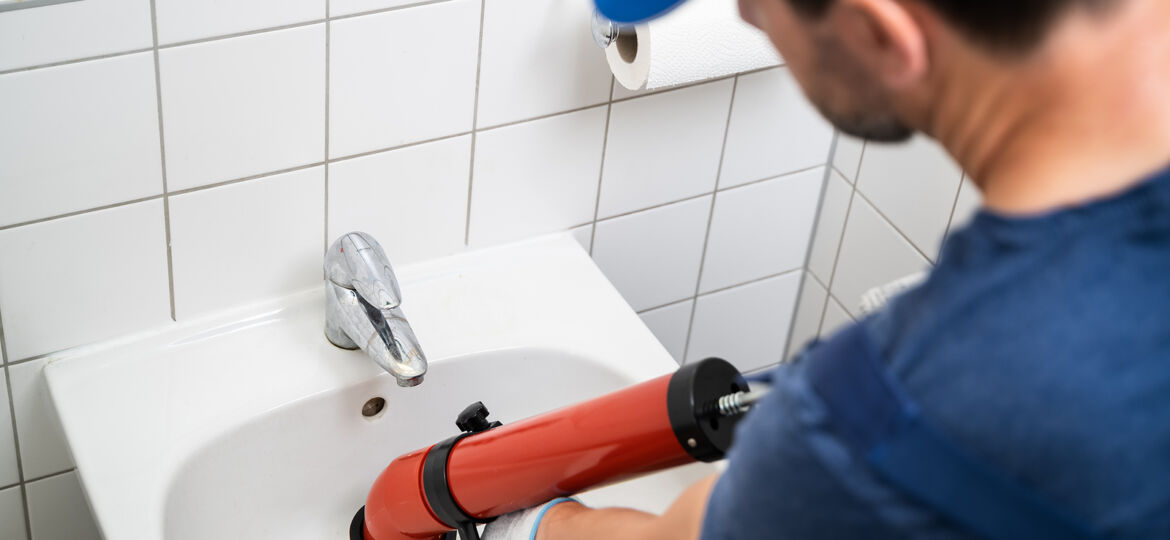
Clogged drains can be a major inconvenience, leading to slow-moving water and even backup in your sink or shower. But how do you know when it’s time to clean your drains?
In this article, the drain cleaning pros at A-Z Plumbing will provide you with guidelines on how often you should clean your drains and tips on how to prevent clogs from forming in the first place. From the bathroom sink to the kitchen drain, you’ll learn the best practices for keeping your pipes clear and flowing smoothly.
How to Tell When Your Drain is Clogged
A clogged drain can cause a number of easily recognizable symptoms, including slow draining, water backup, bad odor, gurgling sounds, and standing water.
If the drain is clogged, water will drain slowly from the sink or bathtub. Furthermore, water may start to back up and overflow from the drain. This can all result in a foul smell coming from the clogged drain. Lastly, as air and water try to escape around a blockage, you may notice a gurgling sound which is almost always a sign of a clogged drain.
It is important to address a clogged drain as soon as possible, as over time, the clog can become more severe and cause lasting damage to your drainage system or water damage to your home.
How Often Should You Clean Your Drains to Prevent Clogs?
The frequency at which you should clean your drains to prevent clogs depends on several factors, including the type of drain, the amount of use, and the substances that are flushed down the drain. For example, kitchen sinks, which are often used to wash food and grease down the drain, should be cleaned more frequently than a drain in a rarely used guest bathroom.
How Often Should You Clean a Kitchen Sink Drain?
Kitchen sink drains tend to get more action and come into contact with more clog-causing substances than any other drain in the home. As such, they will require the most frequent cleaning. Obviously, if you use your kitchen sink more than the average person, you should clean it more often, but a good goal is to clean your kitchen drain every three months.
How Often Should You Clean Your Bathroom Sink Drain?
Bathroom sink drains aren’t as demanding as kitchen sink drains, but they are still exposed to soap scum, hair, and other clog-causing debris on a regular basis. As such, we recommend you clean your bathroom sink drains a minimum of twice a year at six-month intervals.
How Often Should You Clean Your Shower Drain?
Shower drains are exposed to many of the same substances as bathroom sink drains but on a larger scale. The biggest cause of shower drain clogs is hair. To prevent a blockage from forming in your shower drain, you should clean it every three months.
How Often Should You Clean Your Toilet Drain?
Waste and mineral buildup will eventually cause a blockage in your toilet drain if it is not cleaned out on a regular basis. Surprisingly though, toilet drains don’t require as much cleaning as other drains. We have found that an annual cleaning is usually enough to keep a toilet drain flowing as it should.
General Drain Cleaning Tips
It is important to note that the previous recommendations are just that, general recommendations. Your drains may require more or less frequent cleanings. When in doubt, it is a good idea to clean your drains more often than you think you may need.
It is also recommended to practice good drain habits between cleanings, such as not pouring grease or large food particles down the drain, using strainers in drains to catch debris, and running hot water for a few seconds after each use to wash away any accumulated debris.
How to Clean Your Drains
Cleaning your drains is a simple process, and it can likely be performed with materials you have around the house. By following these tips regularly, you can easily clean your drains and prevent clogs from forming. However, if the clog is severe or you cannot clear it yourself, it may be time to contact a professional plumber for assistance.
Cleaning Your Drains With Boiling Water
Cleaning your drains with boiling water is a simple yet effective method for removing debris and minor clogs. What you want to do is boil a pot of water and slowly pour it down the intended drain. The heat from the water serves to loosen and dissolve accumulated grease, soap scum, and other debris commonly found in drains.
Cleaning Your Drains With Baking Soda and Vinegar
Another time-tested solution to cleaning your drains at home is to use a mixture of vinegar and baking soda. Vinegar and baking soda is an affordable alternative to harsh drain cleaning agents, and most people have everything they need at home.
You want to mix equal parts vinegar and baking soda in a large bowl. Once mixed, slowly pour the mixture down the intended drain and allow it to sit for 20-30 minutes. The baking soda breaks down the debris, and the vinegar dissolves it. After the mixture has sat long enough, flush the drain and repeat as needed.
Cleaning Your Drains With Chemicals
Using chemicals to clean your drain can be an effective solution, but it should be used cautiously. Drain cleaners are filled with caustic chemicals that can cause significant damage to your drain if used in excess. Our advice is that if the clog is severe enough that you need chemicals to clean it, it’s probably time to contact a professional.
When Is It Time for Professional Drain Cleaning?
If nothing we covered above was able to free your drain from clog-causing debris, it’s probably time for a professional drain cleaning service. Plumbers like those at A-Z Plumbing use the latest tools and technology to ensure your drain is as clean as it was the day it was installed. Not only that, but a professional cleaning service provides peace of mind and lasting protection against future clogs.
Cleveland Drain Cleaning from A-Z Plumbing
When it comes to Cleveland drain cleaning services, nobody does it better than A-Z Plumbing. Contact us today for the peace of mind you want, and the quality clean your drains deserve.

